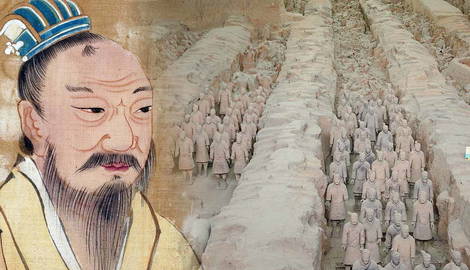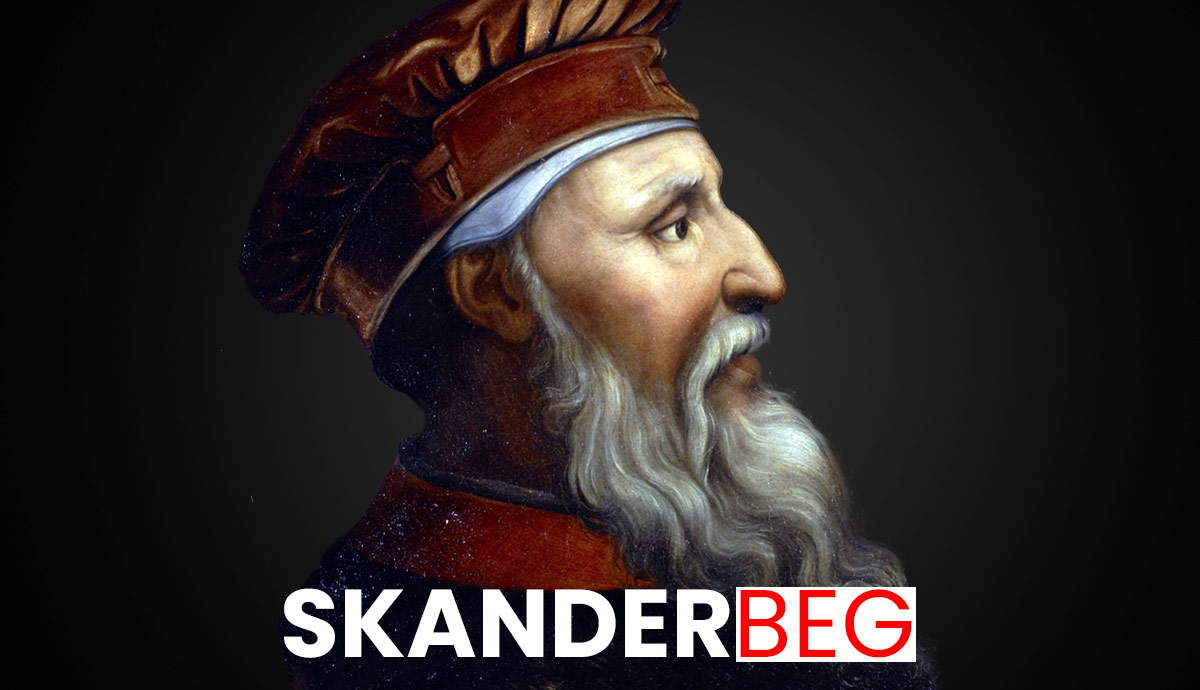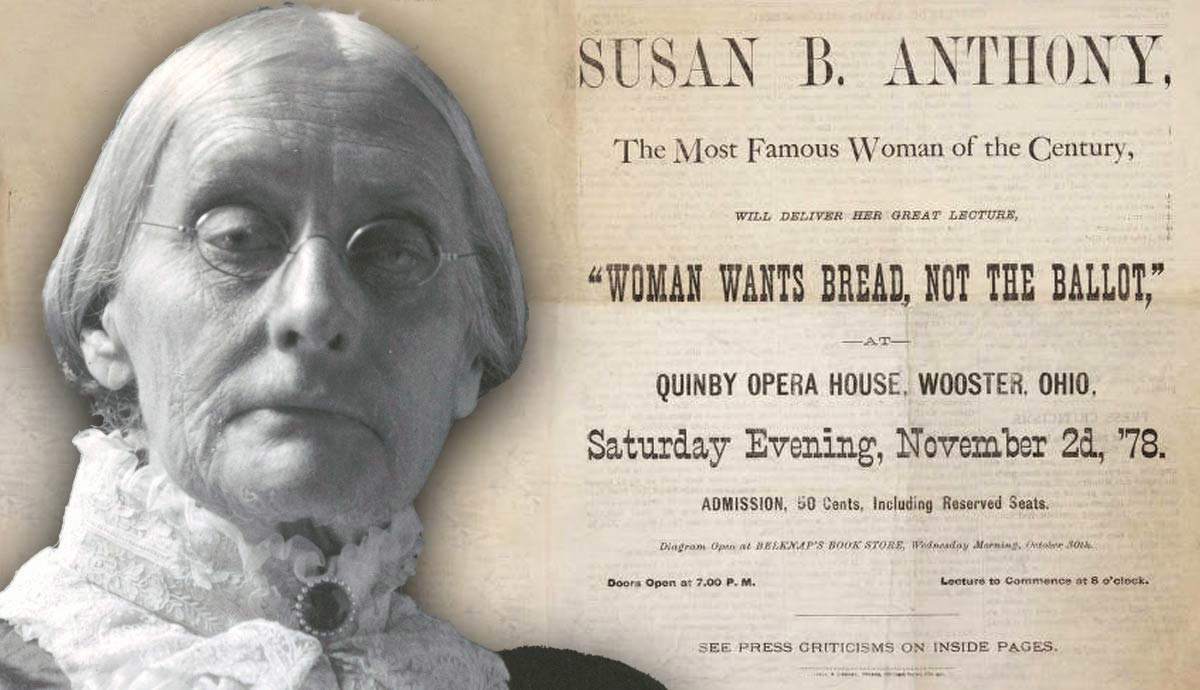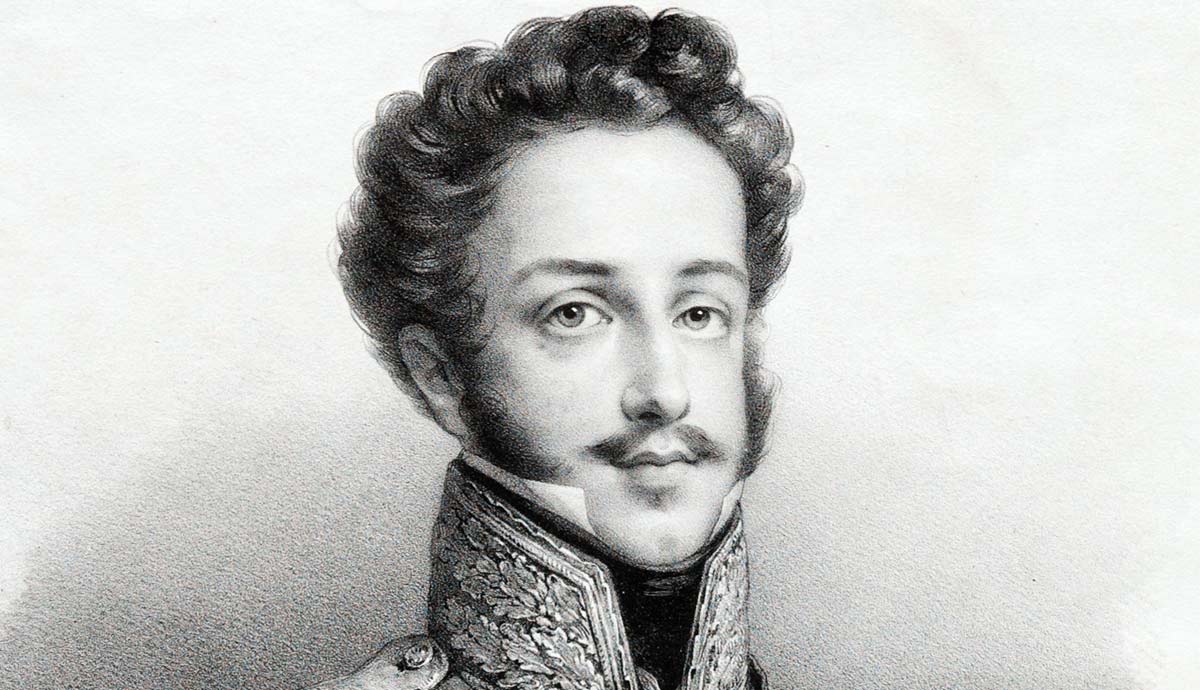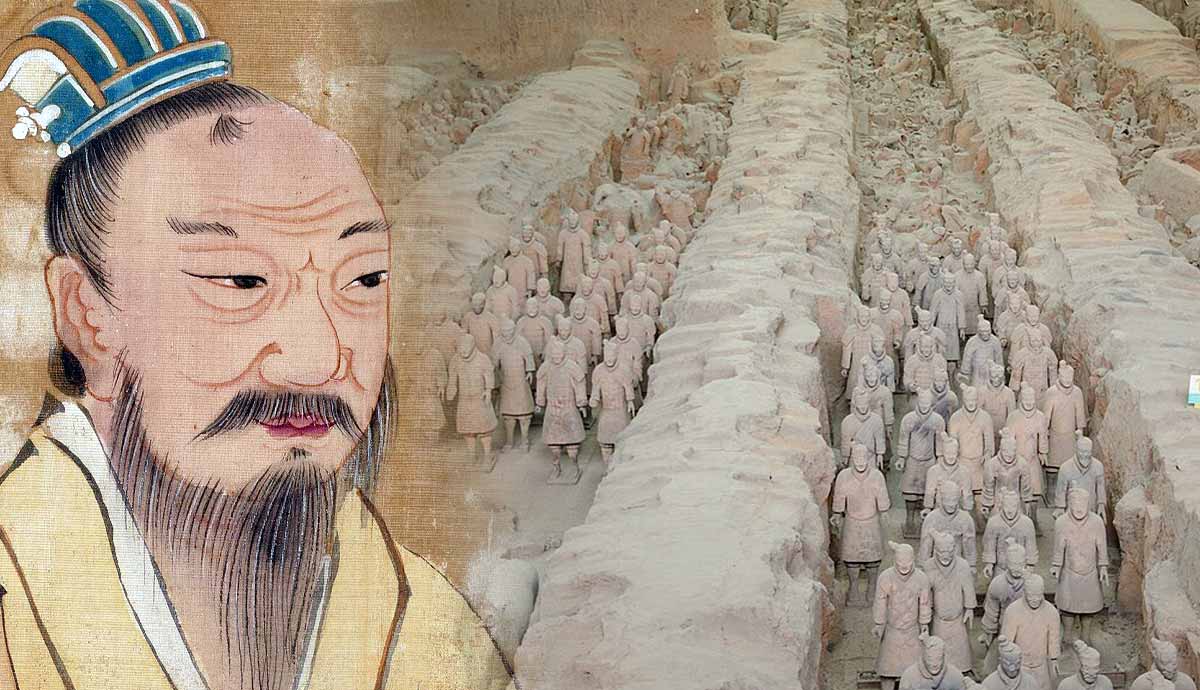
Qin Shi Huangdi, or the First Emperor of Qin, is usually credited with the unification of China. However, the Qin Dynasty collapsed within a couple of years of his death, and China fell into anarchy and disorder as powerful warlords vied for power. One of the rebel leaders, a man of humble birth named Liu Bang, eventually triumphed over his rivals and founded the Han Dynasty, which would rule over a reunified China for the next four centuries.
A Close Escape

In 206 BCE, two powerful Chinese warlords gathered for a feast at the Hongmen Gate in Xianyang, the capital of the recently fallen Qin empire near modern-day Xi’an. They were Xiang Yu, the Duke of Lu, and Liu Bang, the Duke of Pei, whose army had been the first to occupy Xianyang.
While the two men had been allies against the Qin, the feast was held in an atmosphere of mutual suspicion. Xiang Yu, the leader of the coalition, was angry that Liu Bang had reached Xianyang before him. Although his advisor Fan Zeng warned that Liu was planning to rebel against him, Xiang Yu chose to treat Liu with respect and invited him for a feast.
In the meantime, Liu Bang had received a warning from Xiang Yu’s uncle, Xiang Bo, that his life was at risk. At the banquet, Liu apologized to Xiang Yu for being the first to arrive in the Qin capital, but Fan Zeng continued to eye Liu with suspicion and ordered Xiang Yu’s cousin Xiang Zhuang to perform a sword dance and find an opportunity to kill Liu Bang in the process.
Xiang Bo noticed what was happening and joined the sword dance, placing his body between Xiang Zhuang and Liu Bang. The Duke of Pei realized he was in danger and slipped away under the pretext of going to the toilet, leaving his strategist Zhang Liang to offer Xiang Yu his apologies and a pair of jade discs as gifts.
Serving the Qin

Liu Bang was born into a peasant family in Pei County in modern-day Jiangsu Province in eastern China in the mid-3rd century BCE. Liu rose to become a minor provincial official. Around 210 BCE, he was ordered to escort a group of laborers in chains to Mount Li near Xianyang, where the First Qin Emperor was building his mausoleum, of which the famous Terracotta Warriors are only a small part.
The Qin Empire had been established in 221 BCE when King Ying Zheng of Qin conquered the rival Warring States and proclaimed himself an emperor under the title Qin Shi Huangdi—the First Qin Emperor. The emperor had a reputation as a brutal tyrant, and several members of Liu’s work gang chose to run away instead.
Liu Bang knew that any government official who allowed a single man to escape would be subject to capital punishment under the Qin legal system. With nothing to lose, he unchained the other members of the work party and allowed them to go free, and he himself went into hiding. According to Sima Qian, the author of the Records of the Great Historian, ten group members were so impressed by this act of magnanimity that they chose to stay with him.
Rebel Leader

In July 210 BCE, Qin Shi Huang died while on a tour of Eastern China. Owing to a plot by the eunuch Zhao Gao, his eldest son, Crown Prince Fusu, was put to death, and a younger son, Huhai, was enthroned instead as the Second Emperor.
Zhao Gao’s misrule and the absence of a powerful emperor led to an uprising by Chen She’s in the eastern province of Qi in 209 BCE. The rebels reached the gates of Xianyang when Zhang Han, the Qin official supervising the completion of Qin Shi Huang’s tomb, hastily conscripted an army of peasant laborers to defeat the rebels.
In the wake of Chen She’s rebellion, a series of uprisings broke out across the empire, the strongest of which was led by Xiang Liang and his nephew Xiang Yu in the southern region of Chu in 208. Amid the political turmoil, the magistrate of Pei County remained loyal to the Qin government and was overthrown in a popular rebellion, and Liu Bang was invited to take over as Lord of Pei.
As Zhang Han marched east to restore Qin authority, Liu Bang entered an alliance with Xiang Liang. Not long after the latter was killed in battle, Xiang Yu assumed command of the Chu army. Seizing the initiative, he marched north and secured Zhang Han’s surrender at the Battle of Julu in the summer of 207 BCE. In the meantime, as the Qin court succumbed to infighting, Liu Bang broke into the Qin heartland and occupied Xianyang in the winter.
Chu-Han Contention

Following the Feast at Hongmen Gate, Xiang Yu sacked Xiangyang and killed Ziying, the last King of Qin. Rather than founding his own empire, Xiang Yu preferred to divide and rule, establishing himself as Protector-King of Chu with a host of tributary kings under his authority. Although Liu Bang had been promised the Qin heartland of Guanzhong as his fief, the territory was instead divided between three former Qin generals. Liu was given the Hanzhong region south of the Qinling mountains and the title of king of Han.
Angered by Xiang Yu’s decision, Liu prepared to do battle against his erstwhile ally. In the summer of 206 BCE, he invaded Guanzhong and quickly secured the submission of its three kings. He then launched an attack on Xiang Yu’s capital at Pengcheng in April 205 while the Chu king was away on campaign. Although the Han forces briefly occupied the city, Xiang Yu hurried back to Pengcheng with 30,000 elite troops and defeated Liu Bang, who barely escaped with his life.
While Liu Bang struggled to defeat Xiang Yu, his general Han Xin successfully conquered much of eastern and northern China, strengthening Han at the expense of Chu. In January 202 BCE, Han Xin, Liu Bang, and a third Han army converged upon Gaixia in modern-day Anhui province, where the united Han army defeated Xiang Yu. The latter fought a desperate last stand, reportedly killing hundreds of Han soldiers personally before taking his own life.
Advisors and Generals

Liu Bang’s victory at the Battle of Gaixia led him to proclaim the Han empire. While official Han histories represent his victory over Xiang Yu as an inevitability, he owed not only his empire but his survival to three talented subordinates.
Zhang Liang, Liu Bang’s strategist, had been the conduit of Xiang Bo’s warning at the Feast of Hongmen Gate and enabled Liu to escape to safety. Later, when Liu Bang took possession of Hanzhong, Zhang advised his master to destroy the road over the Qinling mountains so Xiang Yu could not pursue him.
Xiao He, Liu’s political advisor and an old friend from Pei County, was responsible for administering Guanzhong and rebuilding the Han army following Liu’s defeat to Xiang Yu at Pengcheng and had previously recommended Han Xin’s appointment as commander-in-chief of the Han army. After the establishment of the Han Empire, Xiao was appointed imperial chancellor and granted more privileges than any other official.
Han Xin had been a low-ranking officer in Liu Bang’s army who defected from Xiang Yu. In 206, he was in the process of leaving Liu Bang’s service out of frustration at being overlooked for promotion when Xiao He chased after him at night and convinced Liu to appoint him commander-in-chief. After leading the reconquest of Guanzhong, Han Xin led an army to conquer northern China while Liu Bang kept Xiang Yu distracted in the Central Plains. Han Xin’s conquests prompted defections to the Han, strengthening Liu Bang until the decisive blow at Gaixia.
Emperor of China

Although he was given the posthumous name of Gaodi or “High Emperor,” Liu Bang’s most common imperial title is Gaozu or “High Ancestor,” the name used by the historian Sima Qian. Gaozu established his capital at Chang’an (modern-day Xi’an) near Xianyang. He announced a general amnesty for his enemies, disbanded his army, and reduced taxes and labor obligations. These measures enabled him to maintain popular support and won praise from Confucian scholars.
Although he maintained the Qin concept of imperial power, Gaozu instituted a hybrid administrative system for his empire. Qin Shi Huang had organized the empire into commanderies administered by governors appointed and dismissed by the central government. Gaozu established 14 commanderies in west and central China but maintained a series of subordinate kingdoms in eastern China, enabling him to reward allies and retain the support of local rulers. Within a decade, most of these kings were demoted and replaced by members of the imperial family.
The collapse of the Qin empire enabled the resurgence of the Xiongnu tribal confederacy to the north under its ruler Modu (known in Chinese sources as Maodun). Gaozu personally led an army against the Xiongnu but was drawn into a trap and besieged at the Battle of Baideng in 200 BCE. After buying his freedom, Gaozu duly abandoned further military enterprises and adopted the heqin policy, in which the Han sent a noblewoman to marry Xiongnu leaders alongside an annual “gift” in exchange for peaceful relations.
An Imperial Legacy

Gaozu died in 195 BCE and was succeeded by his son, the Emperor Hui. Unlike its short-lived predecessor, the Han dynasty survived (with a brief interlude halfway through) for four centuries until the early 3rd century CE. Gaozu’s successors expanded the realm westwards into Central Asia, controlling the eastern end of the Eurasian trading network that came to be known as the Silk Road, enabling indirect trade relations with the Roman Empire. In the north, Han armies campaigned against the Xiongnu and pursued them as far as Lake Baikal. The collapse of the Xiongnu state in the 2nd century CE may have led them to flee west, where three centuries later, they emerged as the Huns.
The Han dynasty was regarded as a golden age of Chinese civilization and had a profound legacy on Chinese national identity. The majority ethnic group in China is known as the Han people or Han Chinese, accounting for over 90% of the Chinese population. Likewise, Chinese characters are known as Hanzi (Han script) in Chinese, and the language itself is called Hanyu (Han language).
Accordingly, while Qin Shi Huang was the first ruler to unify China, it was the Han dynasty founded by Liu Bang that established a stable imperial polity that normalized the concept of a single Chinese state that extended from the deserts of Central Asia in the west to the Pacific coast in the east, and from the Mongolian steppe in the north to the mountains of Yunnan in the south.
